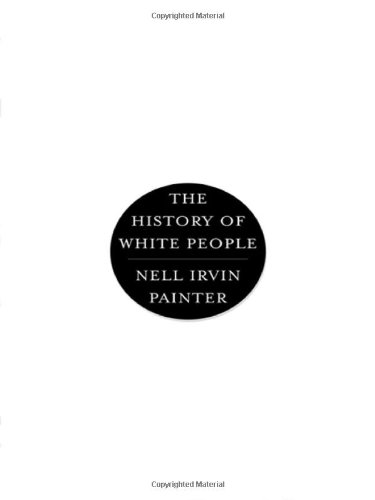Get past the somewhat presumptuous and oddly ambitious airs of the title, The History of White People, and you will find a genuinely absorbing book. In the book, Neil Painter uproots whiteness from its default position as the colorless race, as the invisible pallet against which all other races are defined as colored and places it under the historian’s clinical stare. The immediate value of this move is that it enables Painter to take big and convincing swipes at notions of racial purity. Whiteness, like other forms of cultural identity—blackness, femininity, Americanness, etc.—is an invented and artificial category created and evoked as a mechanism for inclusion and exclusion. Painter’s book is most compelling in its invitation to the reader to re-examine the cultural blinkers that tend to impair visions of self, the world, and its teeming diversity of identities.
For nearly 400 pages, Painter pulls a historical thread that she hopes will unravel a certain mystery surrounding whiteness as history-less. She wants to tell the story of a race that has come to think of itself as not having a story. So beginning from classical antiquity, in a Grecian world where white people did not exist, where, in fact, no races existed, Painter ends up in the world of Obama where whiteness is so ubiquitous that it can be found in anyone from Jennifer Lopez to Beyonce. But what lies between a raceless Greece and a white Obama? According to Painter, a long and labored story about the rise and fall of white superiority. It is not an exaggeration to say that the book is largely an index of early 20th century Euro-American and unbelievably demented racial theories: drivel passed off as science. These theories form, according Painter, the “vast historical literature, much less known today [that] explains the meaning, importance, and honest-to-god reality of the existence of white races.”
While the importance of these “vast, historical literature” in any study of white history is indisputable, it’s difficult to figure out why Painter chooses to think of the construction of whiteness solely within the context of racism and racist ideologies. A history of whiteness, for Painter it seems, is one and the same thing with a history of white supremacist ideologies. This is, perhaps, the weakest point of Painter’s book. Conflating whiteness and racism to the point that both become indistinguishable smacks of intellectual laziness. Painter is a first rate intellectual and even though this book was meant for a broader, non-academic audience, Painter knows better than to take things like that for granted. Even taking the time to explore the difference between the construction of whiteness and the construction of whiteness as supremacist would have yielded far more insight than the historical drama she passes of as objective history.
It is also rather surprising that whiteness never truly changes in a book that claims to lay bare the truth of its evolution. From the moment it is born somewhere in Europe and shipped to America, whiteness remains constant as a sign of racism. Whiteness is often forced to redraw its boundaries to include Irish, Italian, and other European immigrants, but it remains essentially the same: a universal sign of superiority and an instrument of exclusion. It’s the same with blackness, which, in its role as the quintessential sign of all that is non-white, ends up being, in Painter’s book, as immutable as whiteness. The point is that just as blackness cannot be reduced to its function as mere prop for the construction of whiteness, whiteness cannot be reduced to its historical affinity with racism.
Nevertheless, Painter is an academician who has written a book that is refreshingly accessible to a popular audience. The slightly gossipy and conversational tone of her narration pulls the reader in and allows Painter to engage difficult questions about identity in a clear and engrossing manner. As a myth buster, The History of White People is at its strongest and as such should be read for its value in moving us to reflect on the wrongheadedness of any belief we might have in the purity of our respective social identities.
Preview History of White People at Google Books
Order History of White People at Amazon









Nâng cấp ssd June 04, 2016 23:25
Wow, that's what I was searching for, what a stuff! present here at this weblog, thanks admin of this web site.